03/17/2022
Federation on Ground in Poland Aiding Ukrainian Refugees
- Share This Story
COURTNEY BYRNES | STAFF REPORTER
Article reprinted with permission from Cleveland Jewish News
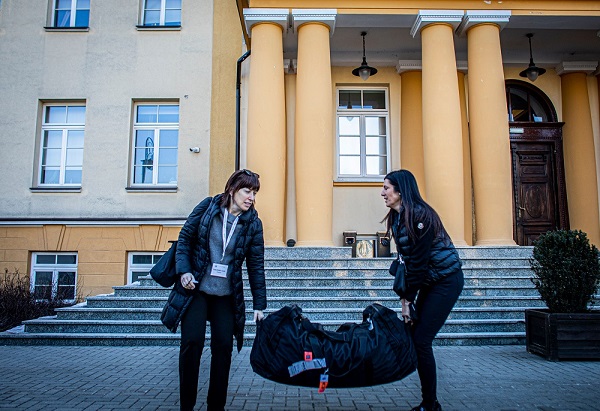
Jewish Federation of Cleveland President Erika B. Rudin-Luria, left, and Becky Heller deliver donations brought by the JFNA delegation for Ukrainian support. Photo/Eyal Warshavsky
Jewish Federation of Cleveland President Erika B. Rudin-Luria and board chair J. David Heller briefed about 200 people March 15 over Zoom from the Warsaw Marriott hotel on their trip to Poland to aid at the border of Ukraine as refugees flee their homes.
The Jewish Federations of North America and a small delegation of leadership were invited to come to Poland, where many Jewish and non-Jewish organizations are working through relief efforts. Among the prominent Jewish organizations mobilized on the ground were JFNA, The Jewish Agency for Israel and the American Jewish Joint Distribution Committee.
“A small group of us from around North America came together in order to show support for the Ukrainian refugees and for our partners here who have been working nonstop since the beginning of the war,” Rudin-Luria said in the briefing.
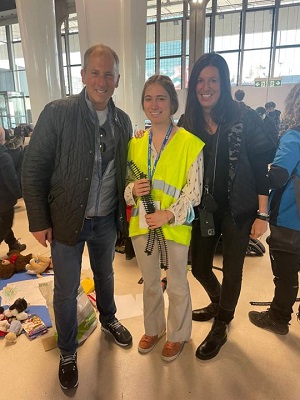
J. David Heller and Becky Heller with a volunteer at the Warsaw train station, where every day thousands of refugees stream through and are given food, SIM cards for cell phones, clothes and help finding their next steps. Submitted photo
Rudin-Luria and Heller spoke of the thousands of refugees coming across the border, the situations they are fleeing from, and the support they are receiving from organizations at the border.
“These are largely people who had to leave husbands and sons and brothers and elderly grandparents, in many cases, behind,” she said. “So many of the people that we met with, they’re waiting, that’s what they said to us. They’re waiting and they’re hoping that they can go back in a week, in two weeks, whenever it is.”
While many of the refugees are taking trains to other European cities or receiving help from Jewish organizations at the border to go to Israel, many are still waiting in hopes to be reunited with loved ones they were forced to leave behind.
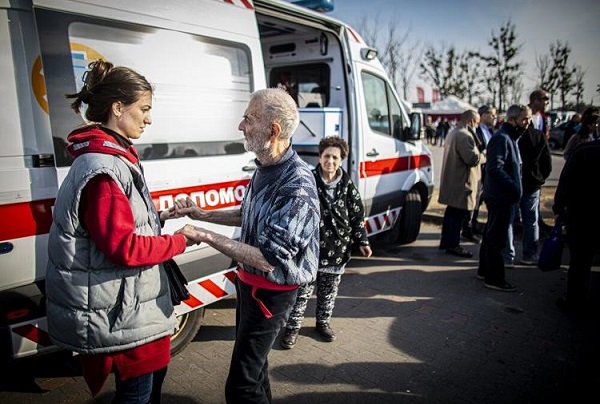
An elderly Jewish Ukrainian refugee who had just crossed the border in a Jewish Agency ambulance, at the Przesyml site. Photo / Eyal Warshavsky
“Story after story that we heard was really a story of separation,” Heller said. “The people that are leaving the country, like we said, so many of them had the hopes that they would be able to stay, so when they ultimately leave, they’re leaving when their town or village begins to get shelled or begins to have a point of desperation.”
When refugees make it through passport control and into Poland, they are welcomed by volunteers and relief organizations who provide them with water, soup and chocolate for the children, before they wait in another line for transportation to a refugee center as their journey continues.
“The takeaway for me, standing at the border and seeing the different agencies, is just seeing the best in humanity, the best in people wanting to help other people as they are crossing the border,” Heller said.
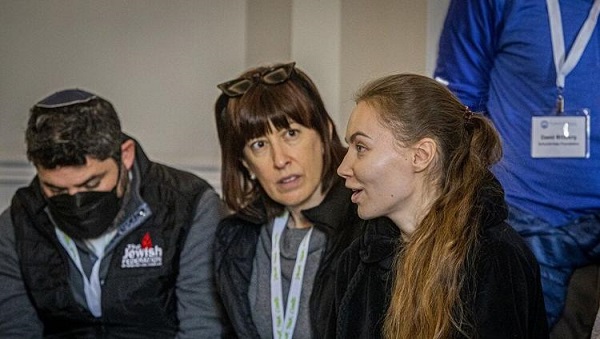
A Ukrainian refugee at a JDC temporary accommodation facility for recently arrived refugees at the Chochmei Lublin Yeshiva, which is now a hotel being used by JDC to host refugees and a warehouse for clothes, baby products, toys to give refugees. Photo / Eyal Warshavsky
Rudin-Luria and Heller recounted the interactions they had with volunteers and refugees and listened to their stories. They visited the border where JDC and Jewish Agency staff are living in tents to meet people crossing, a mall that was converted into a shelter with make-shift beds and baby carriages, and the central train station in Warsaw where volunteers brought toys to children.
“One of the things that you should be proud of in the Cleveland area, and there are people on this call that are very involved in it, is the medical community and the medical supplies that are being shipped over,” Heller said.
He mentioned the efforts of MedWish International, Cleveland Clinic, University Hospitals, Global Cleveland and MetroHealth, which have worked together and sent medical supplies to Poland and into Ukraine.
During the call, Heller mentioned the lack of a strong American presence on the ground aiding with the relief efforts.
“I will tell you the one missing thing that we did not see here on the ground is a United States presence at all ... the welcoming that I have been talking about from the Western European countries has been fantastic,” he said. “You don’t see one American flag. You don’t see anyone discussing America. You don’t see anyone in America saying ‘come’ and ‘we have open arms, we want you to come.’”
He expressed his hope to see more American support on the ground.
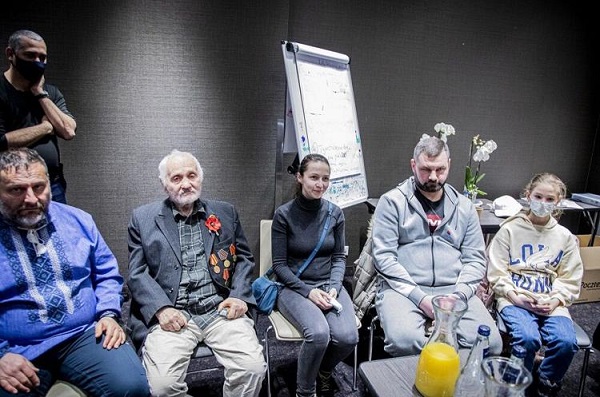
Ukrainian Jewish refugees at the Jewish Agency accommodation facility in Warsaw who are being hosted while their paperwork is completed. Photo / Eyal Warshavsky
Rudin-Luria and Heller also took questions from those in attendance, the first being how people can help, to which they responded that donations to the relief fund is the most efficient way, as volunteering is difficult for people who do not speak Russian.
“The work of The Jewish Agency and of the Joint, together with the dollars that we have been able to raise, are really being put to work and that to me is the most efficient way to continue to contribute to that,” Heller said. “These needs are going to be ongoing and we are not going to walk away from this crisis. We are going to continue to be there for everyone.”
The Cleveland community, along with a $1 million matching grant from the Mandel Foundation, has raised $2,276,405 from 724 donors to support the Ukrainian relief efforts, Rudin-Luria said.
The needs of the community continue to grow every day.
“Even if the war ends today or tomorrow, there will be long-term effects from this and there will be many, many needs that we don’t yet even know about,” Rudin-Luria said. “We know the needs today are greater than the needs for when we set out to begin to raise dollars.”

A volunteer from the Mexican Jewish community at a refugee processing site in Przesyml, a few kilometers from the Ukrainian border talks with a group, including Bekcy Heller, from right, and Jewish Federation of Cleveland President Erika Rudin-Luria. Photo / Eyal Warshavsky
The Associated Press reported March 16 President Joe Biden laid out a wide range of weapons and equipment that America will provide to help Ukraine beat back the Russian invasion.
The new $800 million aid package centers on weapons that the Ukrainian military has already been using effectively against the Russians, AP reported. And it includes air defense systems urgently needed to defend cities from the overwhelming barrage of missiles being launched by Russian forces.
Such systems are highly effective and can shoot down aircraft and intercept ballistic missiles.

